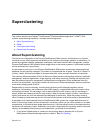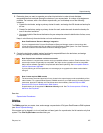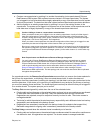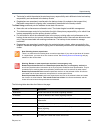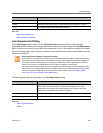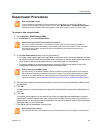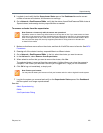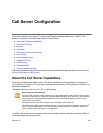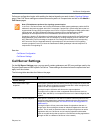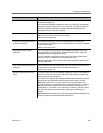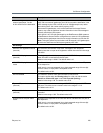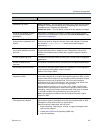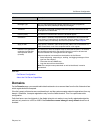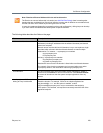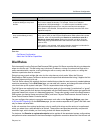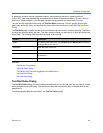
Call Server Configuration
Polycom, Inc. 234
Call server configuration begins with enabling the desired signaling on each cluster’s Signaling Settings
page. Other Call Server settings are shared across all systems in a supercluster and set on the Admin >
Call Server pages.
See also:
Call Server Configuration
Call Server Settings
Call Server Settings
On the Call Server Settings page, you can specify certain gatekeeper and SIP proxy settings used by the
Polycom RealPresence DMA system Call Server. These settings are shared across the supercluster and
apply to all the clusters.
The following table describes the fields on the page.
Note: IPV4 addresses preferred for signaling communication
In an IPv4 + IPv6 environment, the Polycom RealPresence DMA system gatekeeper prefers the IPv4
address for devices that register with both. For example, if endpoint A is a dual-stack device (that is, it
supports both IPv4 and IPv6) and registers over IPv6 to a Polycom RealPresence DMA system that’s
also dual-stack, the RRQ (Registration Request) message informs the RealPresence DMA
gatekeeper of the endpoint's IPv6 and IPv4 addresses (as well as its E.164 alias, etc.).
If endpoint A dials the E.164 address of another dual-stack endpoint (endpoint B), the RealPresence
DMA gatekeeper gives preference to the IPv4 address by sending endpoint B's IPv4 address in the
ACF (Admission Confirm) message to endpoint A. Even though the initial ARQ and corresponding
ACF were over IPv6, the expected behavior is that endpoint A will continue the H.323 signaling
session to endpoint B over IPv4 since the RealPresence DMA gatekeeper informed endpoint A of
endpoint B's IPv4 signaling IP.
Field Description
General Settings
Allow calls to/from rogue
endpoints
If this option is selected, the Call Server permits rogue endpoints to place and
receive calls. Rogue endpoints are endpoints that are in sites managed by the
system, but are not registered and active.
Turning this option off blocks calls from and to rogue endpoints.
This option has no effect on other unregistered network devices (such as
MCUs, GKs, and SBCs) or on endpoints that are not in sites managed by the
system.
Allow calls to inactive endpoints If this option is selected, the Call Server considers inactive as well as active
endpoints when attempting to resolve an address using the Dial registered
endpoints by alias dial rule (see The Default Dial Plan and Suggestions for
Modifications).
Turning this option off can prevent the aliases of registrations that are no
longer active from masking the aliases of endpoints registered to other call
servers. This is useful in situations where an endpoint might have an active
registration with one Call Server and an inactive registration with another
(such as a mobile device that moves from a Call Server handling registrations
through an SBC to a different Call Server in the network).



